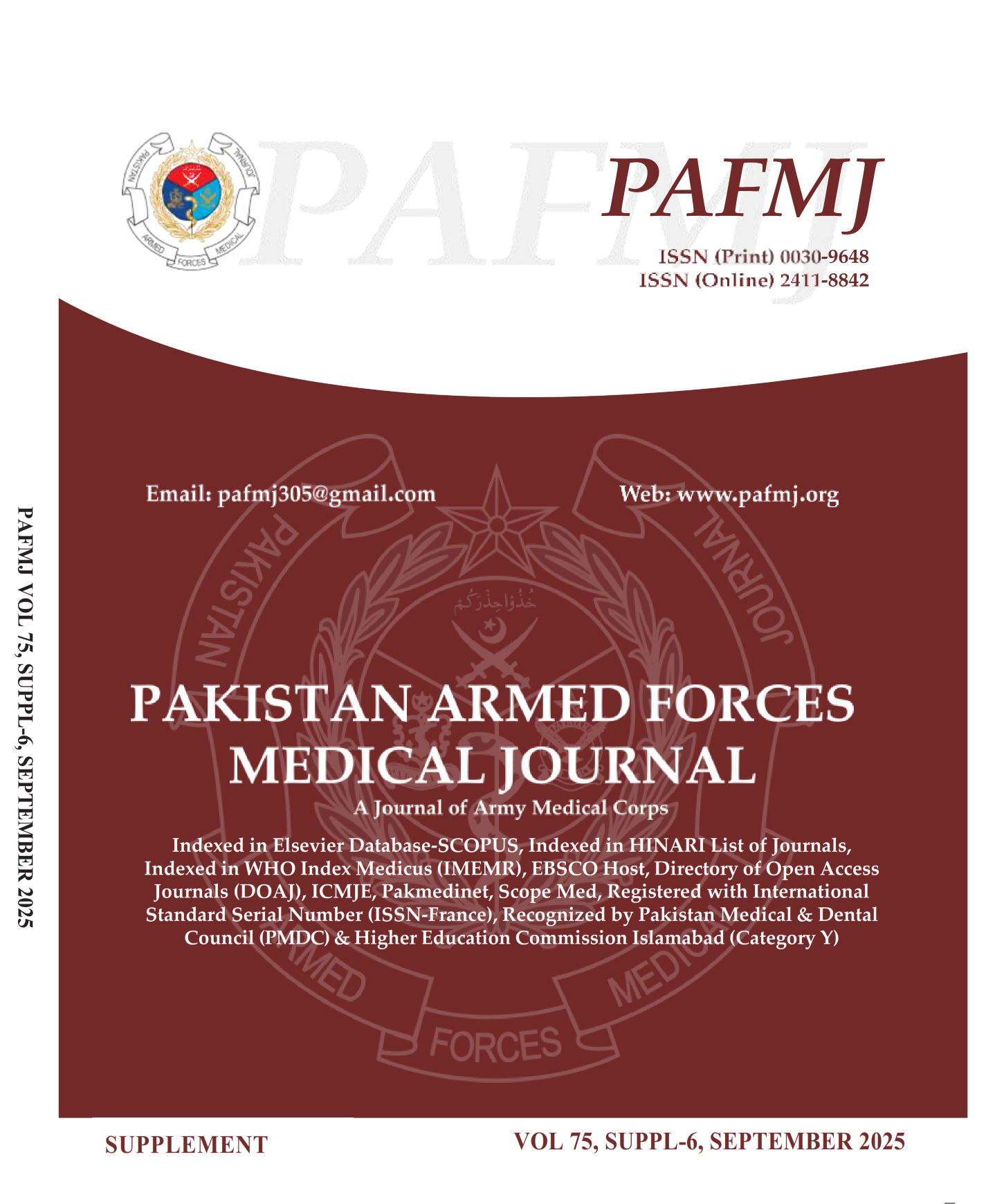Post-Flood Mental Health Crisis:: Neglected Consequences of Natural Disasters
DOI:
https://doi.org/10.51253/pafmj.v75iSUPPL-6.13898Abstract
Floods are often put into perspective within the frame of visible destruction, such as houses and agricultural lands ruined, and damaged infrastructure. Still, the psychological damage that they cause to the victims is no less terrible and is left in them even when the water subsides. Research conducted globally has indicated that floods cause recovery booms of depression, anxiety, and post-traumatic stress disorder (PTSD) in societies that are already poor and have weak health systems. Psychological consequences of natural disasters are a crisis to be considered and be included in the disaster preparedness and disaster recovery policies. The systematic review of the consequences of flooding found a linear association with large levels of depression and PTSD particularly among individuals who were displaced or had their means of livelihood destroyed.1 Greater evidence exists on natural disasters confirming the same trends: exposure to natural disasters is a major risk of mood and anxiety disorders and the impact of disasters on mental health is also likely to be long-term over the years.2 Longitudinal support of this image includes one study, which monitored participants both prior to and following floods, and found sharp rises in distress, anxiety, and PTSD symptoms during the post-disaster period.3 It was found that the exposure to disasters enhances prevalence rates of common mental disorders across all settings, but the extent and duration of the impact varies with vulnerability factors.4 However, interventions remain a few. A meta-analysis of prevention strategies found very little evidence of support of psychosocial interventions in the aftermath of natural hazards and stated that there was much to be desired on scalable mental health responses to the flood-affected population.5
Downloads
References
1. Miller VE, Fitch KV, Swilley-Martinez ME, Agha E, Alam IZ,
Kavee AL, et al. Impact of Hurricanes and Floodings on Mental
Health Outcomes Within the United States: A Systematic
Review and Meta-Analysis. Disaster Med Public Health Prep
2025; 18: e335.
https://doi.org/10.1017/dmp.2024.327
2. Heanoy EZ, Brown NR. Impact of Natural Disasters on Mental
Health: Evidence and Implications. Healthcare (Basel) 2024;
12(18): 1812.
https://doi.org/10.3390/healthcare12181812
3. Nöthling J, Gibbs A, Washington L, Gigaba SG, Willan S,
Abrahams N, et al. Change in emotional distress, anxiety,
depression and PTSD from pre- to post-flood exposure in
women residing in low-income settings in South Africa. Arch
Womens Ment Health 2024; 27(2): 201-218.
https://doi.org/10.1007/s00737-023-01384-3
4. Keya TA, Leela A, Habib N, Rashid M, Bakthavatchalam P.
Mental Health Disorders Due to Disaster Exposure: A
Systematic Review and Meta-Analysis. Cureus 2023; 15(4):
e37031.
https://doi.org/10.7759/cureus.37031
5. Kip A, Weigand L, Valencia S, Deady M, Cuijpers P, Sander LB
et al. Prevention of mental disorders after exposure to natural
hazards: a meta-analysis. BMJ Ment Health 2025; 28(1):
e301357.
https://doi.org/10.1136/bmjment-2024-301357
6. Liu X, Bao M, Wang X, Zhou G. A longitudinal investigation of
mental health outcomes after the Henan floods in China:
Examining predictors of resilience trajectories. Psych J 2024;
13(6): 993-1003.
https://doi.org/10.1002/pchj.781
7. Rahman MM, Shobuj IA, Alam S, Sadia AM, Khanam S,
Hossain MT, et al. The unforeseen tide: exploring mental health
impacts of the 2024 flash flood in Bangladesh. BMC Public
Health. 2025; 25(1): 2728.
https://doi.org/10.1186/s12889-025-24118-9
8. Rahman MM, Shobuj IA, Hossain MT, Alam E, Islam MK,
Hossain MK et al. Flood impact on men's mental health:
evidence from flood-prone areas of Bangladesh. Front Public
Health 2025; 13: 1529558.
https://doi.org/10.3389/fpubh.2025.1529558
9. Batra M, Erbas B. Extreme Weather, Vulnerable Populations,
and Mental Health: The Timely Role of AI Interventions. Int J
Environ Res Public Health 2025; 22(4): 602.
https://doi.org/10.3390/ijerph22040602
10. Akram S, Mushtaq S. Environmental change and floods: the
long-ignored effects of displacement on mental health. Front
Public Health 2024; 12: 1434123.
https://doi.org/10.3389/fpubh.2024.1434123
11. Raza M, Fatima A, Habiba U, Shah HH. Public health
implications of severe floods in Pakistan: assessing the
devastating impact on health and the economy. Front Environ
Sci 2023; 11: 1091998.
https://doi.org/10.3389/fenvs.2023.1091998
12. Law S, Marinova T, Ewins L, Marks E. Understanding the
psychological impact of flooding on older adults: A scoping
review. Ann N Y Acad Sci 2025; 1548(1): 99-115.
Downloads
Published
Issue
Section
License

This work is licensed under a Creative Commons Attribution-NonCommercial 4.0 International License.















